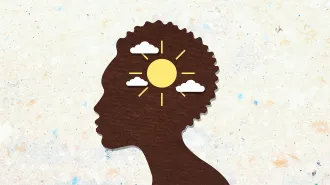Signs of Huntington’s show up in the brain in childhood
Protein involved in adult onset disorder affects brain development, study finds
CHICAGO — Huntington’s disease usually appears in middle age but actually begins long before then, a new study suggests. The rogue protein that causes the disease seems to cause trouble as the brain is built.
Huntington’s is a devastating inherited disorder marked by uncontrollable movements, emotional impairment and psychiatric illness. Symptoms usually appear in a person’s 40s as nerve cells deteriorate in part of the brain called the striatum. But changes in the brain’s wiring show up decades earlier, Jessica Lee of the University of Iowa in Iowa City reported October 18 at the annual meeting of the Society for Neuroscience.
With functional MRI, Lee and her colleagues scanned the brains of 26 children ages 6 to 18 who had inherited a dangerous version of the huntingtin protein. These children will go on to develop Huntington’s disease. The brain scans were done while the children rested quietly, which allowed the researchers to see coordination among different parts of the brain.
Compared with 36 children who had the usual versions of the huntingtin protein, the children who will get Huntington’s disease had differences in how the striatum connects with other parts of the brain.
Some of these connections, such as those involved in movement and emotions, were weaker in the kids who will go on to develop Huntington’s disease. A different connection involved in thinking skills was actually stronger.
“Decades before the onset of Huntington’s disease, having this genetic mutation actually affects the brain development,” Lee said.
Researchers don’t yet know if these brain changes result in any behavioral changes. All of the children fell within the range of normal on a series of movement and brain tests, though subtle changes may exist, Lee said.
The results illustrate the importance of timing, says psychiatrist Jay Giedd of the University of California, San Diego. Genes can have profoundly different effects early in life and later in life, he said.
Lee said she hopes her work will clarify the huntingtin protein’s role in brain development, knowledge that may eventually help other scientists know when and where to target potential gene therapy treatments. She and her team plan to follow brain development in these children as they grow.







